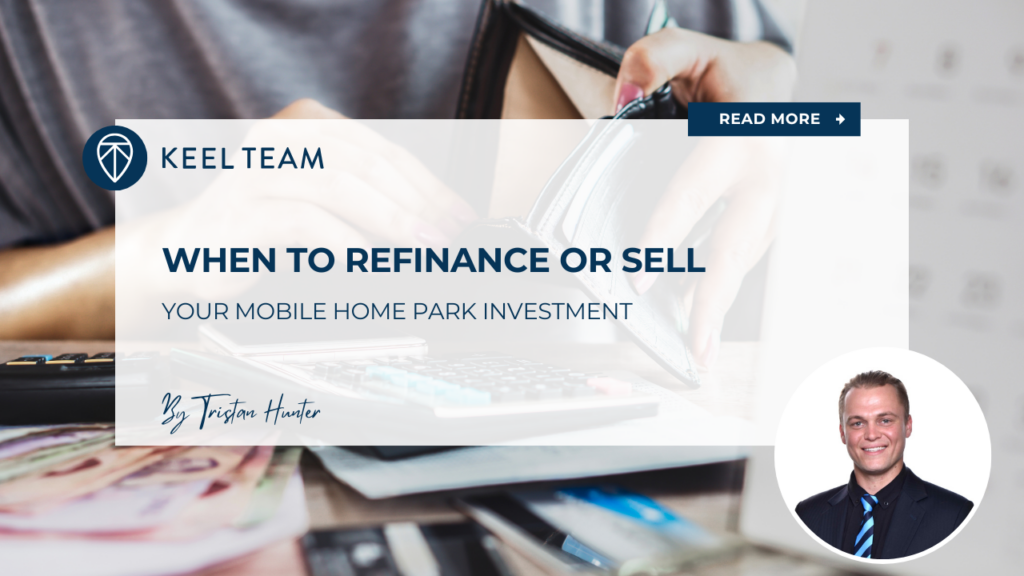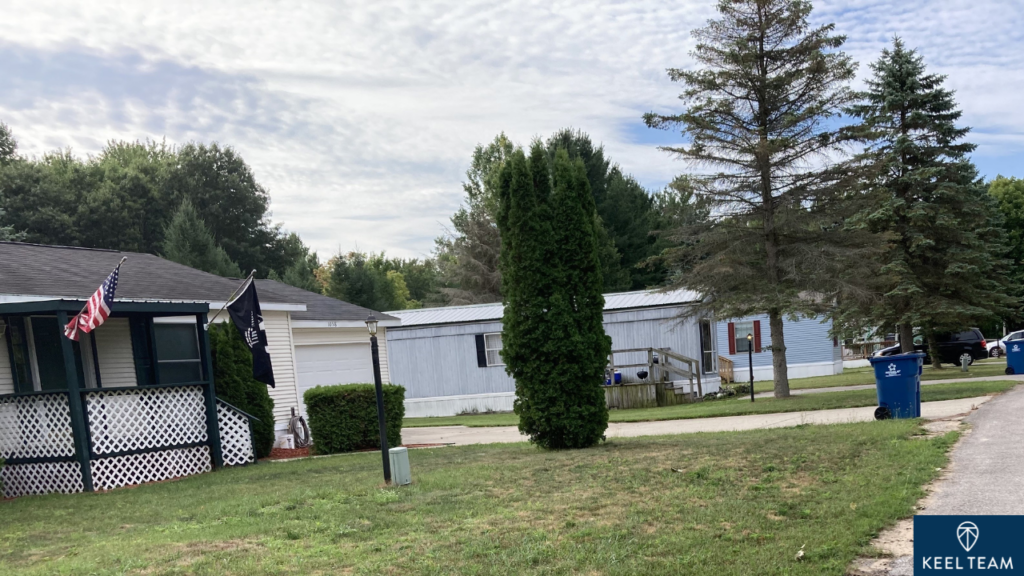When to Refinance or Sell Your Mobile Home Park Investment
-
 Tristan Hunter - Investor Relations
Tristan Hunter - Investor Relations

Successfully managing a mobile home park investment often means knowing when to adjust your exit strategy. Investors looking to refinance or sell their assets typically make informed decisions based on various factors. Let’s explore these two exit strategies, diving into refinancing with agency debt, the role of net operating income (NOI), and how interest rates influence the timing and choice between the two.
Refinancing Your Mobile Home Park Investment
Refinancing offers a potential way to restructure debt, free up capital, or lock in better loan terms. For mobile home parks, agency debt is often the preferred option due to the historically favorable interest rates and flexible terms.
What is Agency Debt Refinancing?
Agency debt refers to loans offered by government-backed agencies like Fannie Mae or Freddie Mac. These institutions typically favor mobile home parks due to their past consistent cash flow and stable occupancy rates. Refinancing through agency debt might allow you to secure long-term, fixed-rate loans with competitive interest rates, helping you reduce monthly payments and improve your cash flow potential.
Moreover, refinancing can potentially unlock equity in your mobile home park investment. As the value of the property increases, you could tap into that equity to reinvest in other opportunities or enhance the trailer park’s infrastructure.
Download our FREE eBook on the Top 20 things to know BEFORE investing in mobile home parks!
How Increasing NOI Affects Refinancing Options
The ability to refinance at favorable terms often depends on the strength of the mobile home park’s net operating income (NOI). NOI reflects the property’s income after operating expenses, excluding debt payments. Higher NOI generally increases the value of your mobile home park, which may lead to more attractive refinancing options.
To potentially boost NOI, investors can look at:
- Filling vacant lots to increase rental income.
- Implementing a utility bill-back system to lower expenses.
- Improving property management to reduce operational costs.
- Increasing rents to market-related prices.
A higher NOI likely strengthens your refinancing case by proving the trailer park’s profitability. This way, lenders are typically more willing to offer better terms, knowing the investment is well-managed and likely to maintain its value.
The Role of Interest Rates in Refinancing
Interest rates play a significant role in deciding when to refinance. In a low-interest-rate environment, refinancing can be a strategic move to lock in more affordable debt for the long term. However, when interest rates rise, refinancing might become less attractive because it may increase your borrowing costs. We opt for fixed debt terms on our mobile home park deals, which we’ve found from experience, can provide more of a safety net in the event of rising borrowing costs.
Timing is critical. Monitoring the economic landscape could help you determine the right moment to refinance. If the Federal Reserve signals an increase in rates, refinancing sooner might help you avoid future cost hikes. On the other hand, if rates are expected to drop, waiting could result in more favorable terms.

When Selling Might Be the Right Move
Selling your mobile home park investment is another exit strategy that can yield potential returns, particularly when market conditions align with your financial goals. However, the decision to sell should depend on several considerations and your goals, of course.
Evaluating Market Trends
A strong real estate market with high demand for affordable housing could signal a good time to sell. Mobile home parks continue to attract investors due to their historical resilience and the growing need for affordable living options. If occupancy is high and buyers are actively seeking mobile home parks, you could potentially achieve a higher sale price.
Conversely, selling during market slowdowns might mean lower offers or a longer time to close deals. Keeping an eye on local and national market trends can help you decide when selling makes sense.
The Impact of Your Investment Goals
Your personal investment goals also shape the decision to sell. If your goal is short-term profit, selling after making significant improvements may align with your strategy. However, if you aim to build long-term wealth, refinancing and holding onto the property might offer better opportunities for steady cash flow potential over time.
Understanding Buyer Expectations
Buyers often look for mobile home parks with strong NOI and growth potential. Preparing the property for sale often involves ensuring that financial records are in order, the property is well-maintained, and any deferred maintenance has been addressed. Meeting these expectations may help you attract higher offers from prospective buyers.
Comparing Refinancing vs. Selling
Deciding between refinancing and selling can be challenging. Both strategies come with their potential advantages and risks. Refinancing might allow you to maintain ownership, benefit from ongoing income, and leverage debt more efficiently. On the other hand, selling typically offers a clean exit, providing liquidity to reinvest in new ventures.
Here’s a quick comparison:
| Aspect | Refinancing | Selling |
|---|---|---|
| Cash Flow Impact | May improve cash flow by lowering payments | No ongoing cash flow after the sale |
| Ownership | Retain ownership and control | Transfer ownership entirely |
| Loan Terms | Potential for long-term, fixed rates | No debt obligations after selling |
| Market Sensitivity | Rates impact loan terms | Market conditions impact the sale price |
| Investment Flexibility | Unlock equity for reinvestment | Full liquidity for new investments |
Key Takeaways
The decision to refinance or sell your mobile home park investment depends on several variables. Refinancing with agency debt could offer opportunities to secure better loan terms and improve cash flow potential, especially if NOI has increased. However, interest rates heavily influence the timing of refinancing, making it essential to stay updated on market trends.
Selling, on the other hand, provides liquidity and a clean exit, which might be ideal for those seeking to reinvest elsewhere or shift their investment strategy. Monitoring the real estate market, assessing your financial goals, and preparing your mobile home park for sale are essential steps to maximize potential returns.
Ultimately, both strategies offer potential benefits, and the right choice depends on your unique investment goals and market conditions. Whether you choose to refinance or sell, careful planning and strategic timing will likely improve your outcomes with mobile home park investing.
Are you looking for MORE information? Book a 1-on-1 consultation with Andrew Keel to discuss:
- A mobile home park deal review
- Due diligence questions
- How to raise capital from investors
- Mistakes to avoid, and more!
Disclaimer:
The information provided is for informational purposes only and is not investment advice or a guarantee of any kind. We do not guarantee profitability. Make investment decisions based on your own research and consult registered financial and legal professionals. We are not registered financial or legal professionals and do not provide personalized investment recommendations.

Tristan Hunter - Investor Relations
View The Previous or Next Post
Subscribe Below 👇





